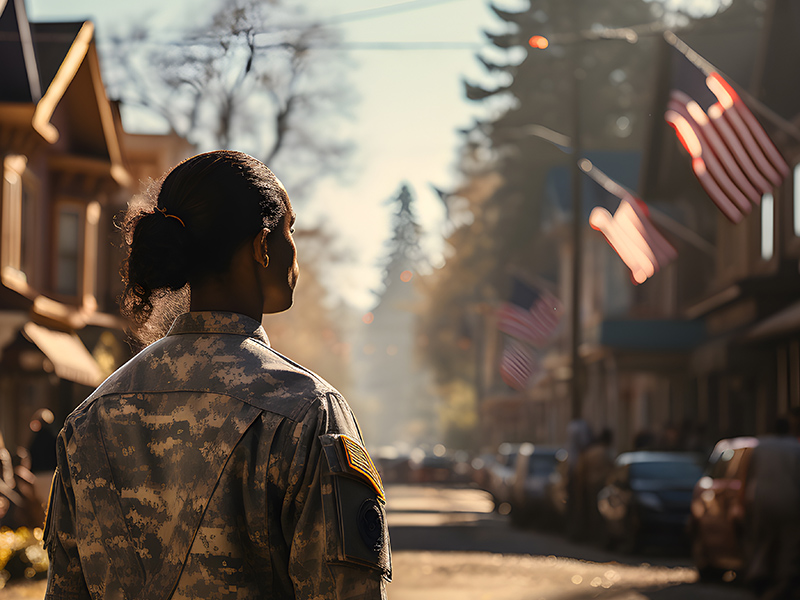Seeking Shalom: Working Toward Just Atonement
What Is Behind and Beyond: “Thank You for Your Service?”

By Joshua T. Morris
On November 11, we set aside a day to commemorate Veterans Day. Originally designated as Armistice Day, November 11 was a day for recognizing the cessation of hostilities of the First World War (on the 11th hour of the 11th day of the 11th month). In the United States, it is one of what I call the three High Holy Days of the Veteran Calendar—the other two being Memorial Day and Independence Day. The liturgical phrase for Veterans Day is “Thank you for your service.” It is crucial to thank and show appreciation for those who have served—and continue to serve—our country. The phrase is not the problem. However, it is a symptom of a broader malaise within our country.
While drinking a free Krispy Kreme coffee on Veterans Day, I thought about what our gratitude does. Is our gratitude merely displayed with free coffee, discounted restaurant menu items, and a month of the National Football League wearing “Salute to Service” gear? After two decades sustaining a war effort in two countries, why doesn’t our gratitude manifest itself in doing more to end those wars? I am not naive enough to think public opinion could have ended those wars entirely (the lack of consideration of millions of voices raised in anti-war protest across the globe in February 2003 comes to mind), but I am hopeful enough to offer proactive strategies for care.
The crux is this: Although U.S. forces withdrew from Afghanistan in August 2021, the war has not ended for many veterans and their families. The ongoing ramifications of multiple deployments, service-related trauma, an increase in suicidality, and moral injury indicates that something deeper continues to impact our veterans. One of the spaces in which this plays out is access to healthcare. Healthcare in general—and the potentially morally injurious events (PMIEs) related to working within the U.S. healthcare system specifically—are enough to warrant their own articles, but I want to focus on healthcare for veterans. Whether the issue is wait times at Department of Veterans Affairs hospitals and clinics or the continued stigma related to receiving mental healthcare, this is an avenue in which our gratitude can go further.
Zachary Moon, a former military chaplain and professor of pastoral theology notes that we typically classify veterans as a “hero” or a “head case”: We think we know how to care for the heroes (reverence), and we allow the “head cases” to fall through the cracks. The head cases are the broken, substance-abusing, homeless (veterans reportedly account for 10.6% of the entire homeless population in the U.S.), and suicidal veterans. This is an ideological problem we can get beyond. Our veteran community is not a binary. To help normalize veteran care, there are proactive steps the church can take.
I encourage you to get to know the veterans in your community. We must refrain from tokenizing them and addressing their concerns only on the High Holy Days of the Veteran Calendar. To get beyond the hero/head case binary, we need to engage in participation with the veterans in our communities. Once we get to know these veterans, when we are ready, we can begin to hear their stories of service. This is what “Thank you for your service” misses: the next step. Listening to the stories of our veterans is sacred work. To bring veterans home fully, we must make space for their experiences. The church must attend to stories of suffering. We not only make meaning out of our experiences through story, but story also binds us in solidarity to one another.
Finally, then, we need to become comrades with veterans. Our camaraderie influences how we vote. When our care of veterans goes beyond three days a year, we take notice of how public policy impacts the veterans in our community. We begin to vote differently. We begin to advocate differently. And, hopefully, we begin to ask more questions of our elected officials before armed conflict escalates.
This is a task of the church, and may we have the courage to take it up.
Josh Morris is an ordained minister with the United Church of Christ and a board-certified chaplain with the Association of Professional Chaplains.
Prior to accepting the call to join the UPSem faculty, Morris served in pediatric healthcare for 11 years, most recently as the assistant director of spiritual services at Children’s Mercy Hospital in Kansas City. Morris also has 15 years of experience as an army chaplain in the United States Army Reserve. In previous army chaplain assignments, he served at various echelons throughout the United States and deployed to Afghanistan in support of Operation Enduring Freedom.
His previous teaching experiences include visiting professor of chaplaincy studies at Phillips Theological Seminary, as well as adjunct professor of practical theology, spiritual car, and counseling at Claremont School of Theology and Saint Paul School of Theology.
Morris is the author of Moral Injury Among Returning Veterans: From “Thank You for Your Service” to a Liberative Solidarity and numerous peer-reviewed articles in Pastoral Psychology, Journal of Pastoral Theology, and Reflective Practice. He speaks nationally and internationally on matters of moral injury, reintegration, and spiritual care.

